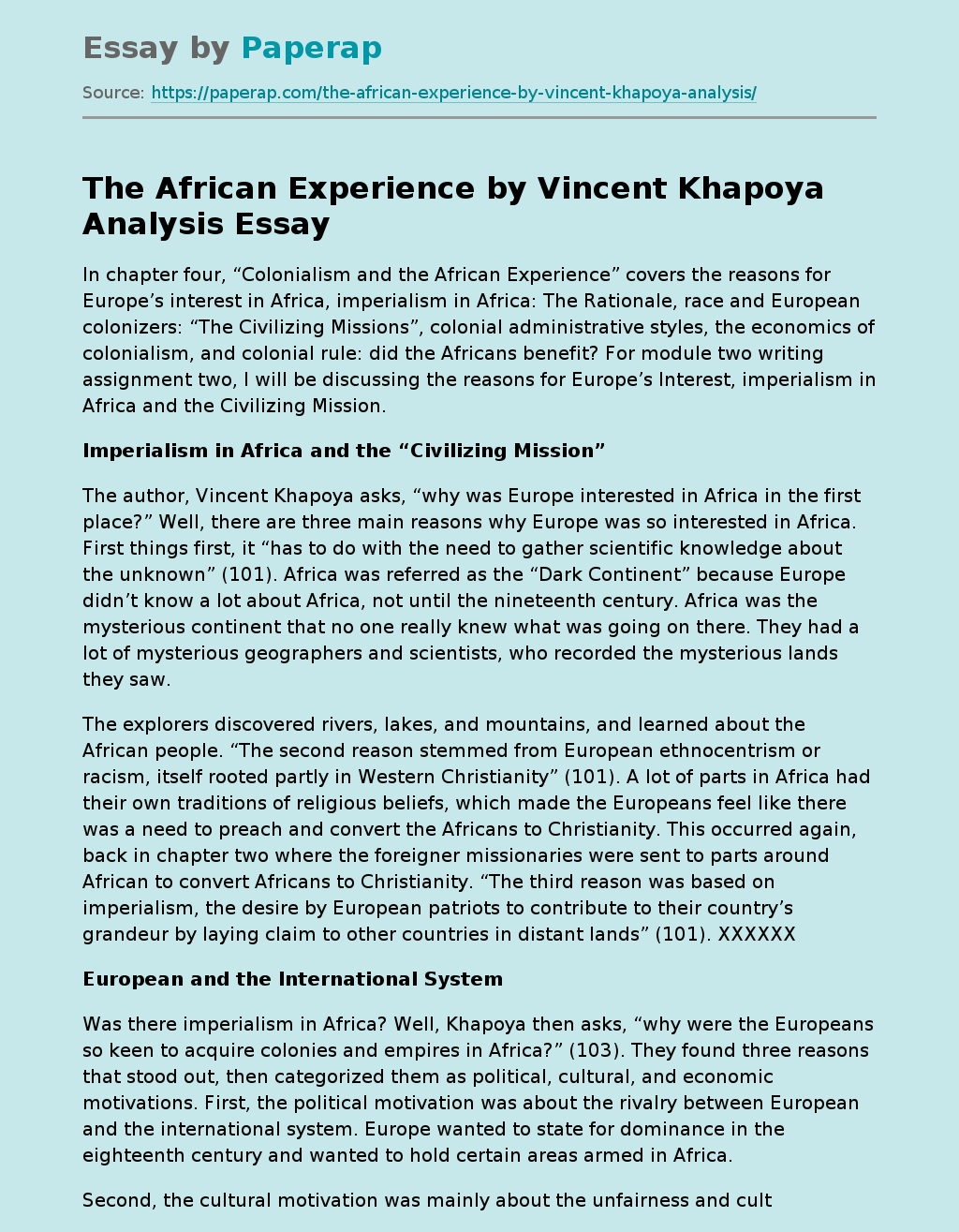The African Experience by Vincent Khapoya Analysis
In chapter four, “Colonialism and the African Experience” covers the reasons for Europe’s interest in Africa, imperialism in Africa: The Rationale, race and European colonizers: “The Civilizing Missions”, colonial administrative styles, the economics of colonialism, and colonial rule: did the Africans benefit? For module two writing assignment two, I will be discussing the reasons for Europe’s Interest, imperialism in Africa and the Civilizing Mission.
Imperialism in Africa and the “Civilizing Mission”
The author, Vincent Khapoya asks, “why was Europe interested in Africa in the first place?” Well, there are three main reasons why Europe was so interested in Africa.
First things first, it “has to do with the need to gather scientific knowledge about the unknown” (101). Africa was referred as the “Dark Continent” because Europe didn’t know a lot about Africa, not until the nineteenth century. Africa was the mysterious continent that no one really knew what was going on there. They had a lot of mysterious geographers and scientists, who recorded the mysterious lands they saw.
The explorers discovered rivers, lakes, and mountains, and learned about the African people. “The second reason stemmed from European ethnocentrism or racism, itself rooted partly in Western Christianity” (101). A lot of parts in Africa had their own traditions of religious beliefs, which made the Europeans feel like there was a need to preach and convert the Africans to Christianity.
This occurred again, back in chapter two where the foreigner missionaries were sent to parts around African to convert Africans to Christianity. “The third reason was based on imperialism, the desire by European patriots to contribute to their country’s grandeur by laying claim to other countries in distant lands” (101). XXXXXX
European and the International System
Was there imperialism in Africa? Well, Khapoya then asks, “why were the Europeans so keen to acquire colonies and empires in Africa?” (103). They found three reasons that stood out, then categorized them as political, cultural, and economic motivations. First, the political motivation was about the rivalry between European and the international system. Europe wanted to state for dominance in the eighteenth century and wanted to hold certain areas armed in Africa.
Second, the cultural motivation was mainly about the unfairness and cultural overconfidence of the European people. If they saw anyone different, they considered them “as being culturally inferior” (104). To whomever was not to their standards, culturally, they would be bias to anyone different. They felt like it was their job to “civilize” and “uplift” the Africans, says Khapoya. Finally, the economic motivation was about the scholars and thinkers. “Early literature on colonization is replete with references to the vast resources and markets represented by Africa and the economic benefits that would accrue to the European powers by opening the Africa continent” (106).
There were four civilizing missions, the British Mission, French mission, Portuguese mission, and Belgian mission. All four of their missions had a main motivation to civilize the Africans, but all did it somewhat differently. For the British mission, native people and British were separated. They separated their social institutions, for example like schools, recreational facilities, and hospitals. They were all maintained and separated into different racial groups.
The British would let an African to buy “a house in a predominantly white area or to ride a first- class compartment if he did not share it with a European…” (107). For the French mission, they observed and studied the Africans and their culture. The French had a social policy called “the assimilation policy”, which was based one “the very laudable revolutionary ideal of human equality, but only under French suzerainty” (108). They believed that their mission was to concert the Africans into Frenchmen. During the Portuguese mission, the Portuguese were racist toward Africans. Just like the other missions, they also had a “civilizing mission”.
Even though each mission was somewhat different, Portuguese was a mix of the French and the English. Their civilizing mission was about ancestry and culture. Finally, the last mission, the Belgian mission. Belgium’s king, Leopold II, figured out how to outsmart Portugal, France, Britain, Germany, and the United States into his wait on civilizing the Africans. Leopold II was not a good man. Leopold II basically took advantage of all the territories he claimed. He wanted to have so much money and power, so he was willing to do whatever he had to do to make more money and be in power.
The African Experience by Vincent Khapoya Analysis. (2021, Nov 08). Retrieved from https://paperap.com/the-african-experience-by-vincent-khapoya-analysis/

